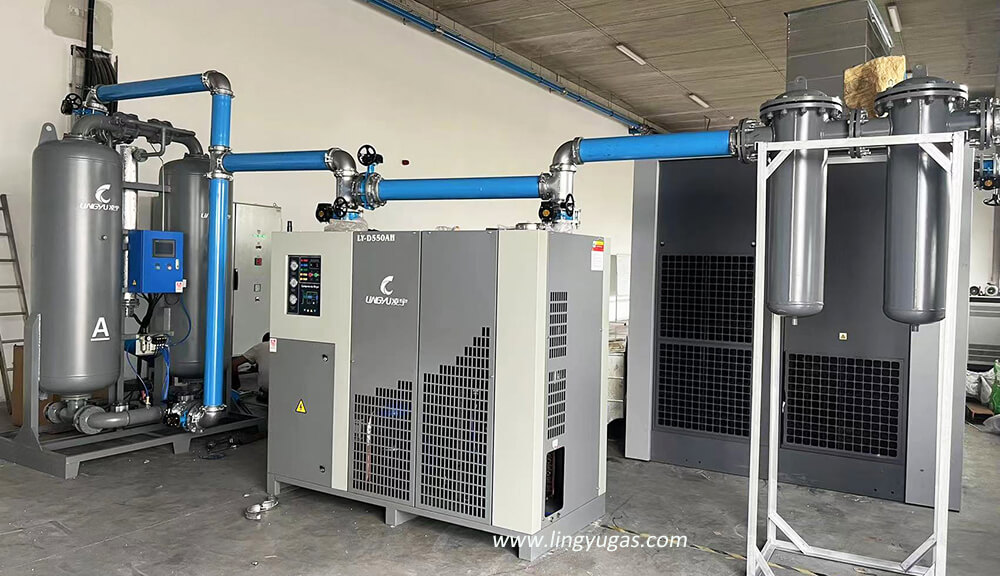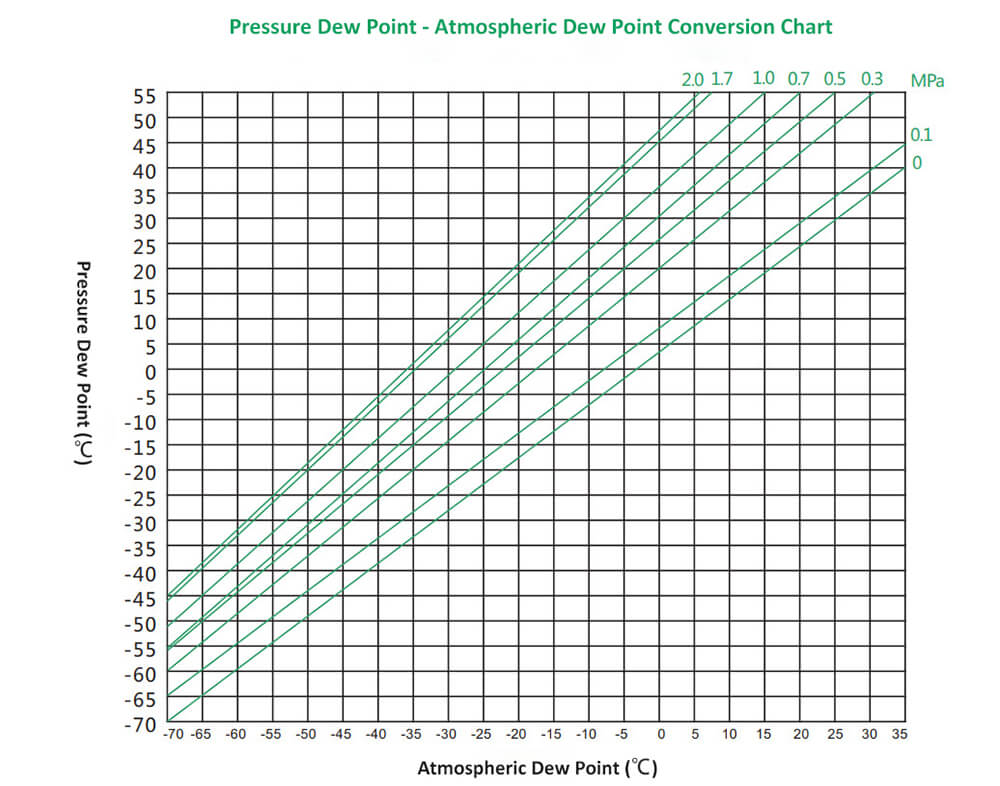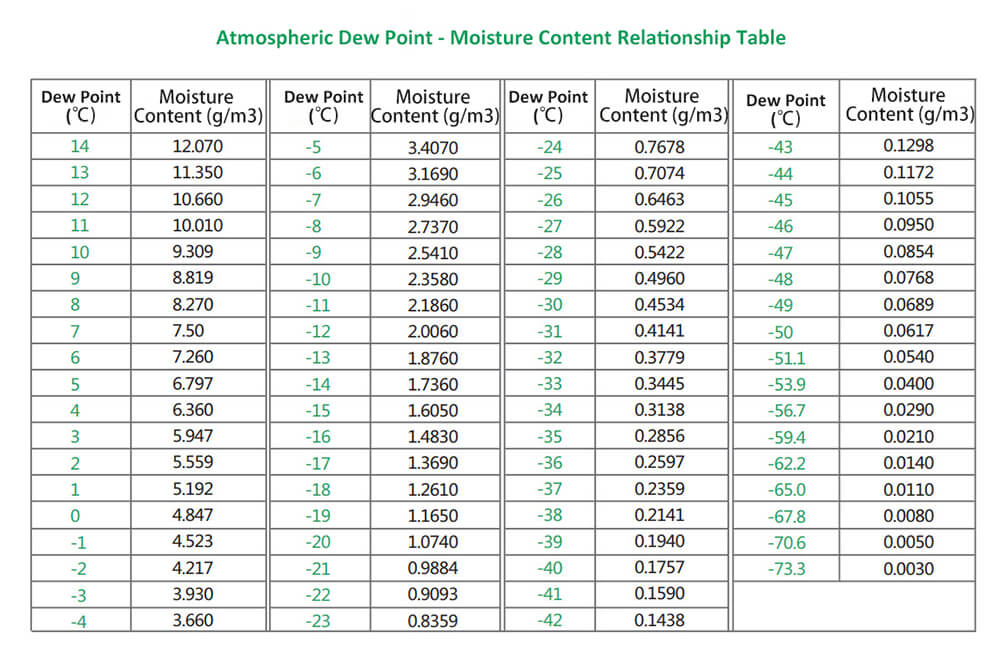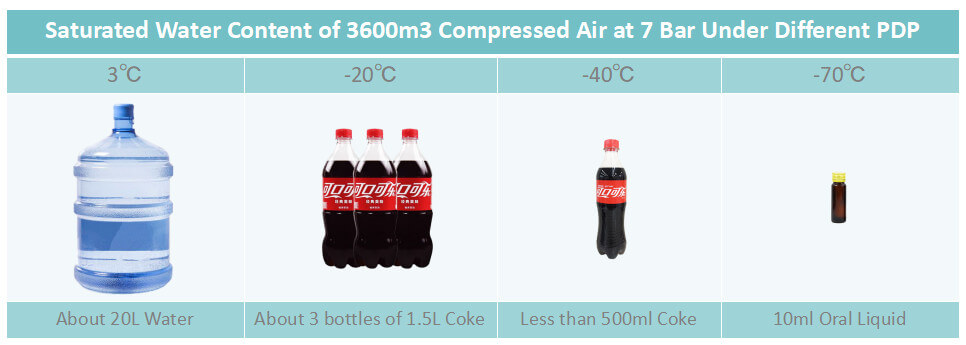Compressed air has wide applications in the industrial sectors. We need clean and dry air. Because there are many solid, liquid, and gaseous pollutants. They may damage your production system and products. Among them, moisture can lead to pipe corrosion. Also, lead to the failure of pneumatic equipment. Besides, water will also spoil the products. So, the dryer is very important to the compressed air system.
Besides, many industries have requirements for air quality. Of course, different industries have different dryness requirements. In this article, we will analyze why compressed air requires a dryer.

Lots of Moisture in Compressed Air System
All air compressor systems will generate condensation. Firstly, the atmosphere contains many water vapor. During compression, moisture enters the system together. As the pressure rises and cools, they turn into liquid water. These water droplets mix with air. Finally, they become moist air.
Moreover, the water vapor content will increase sharply with the increase in pressure. For example, compress the room air to 8 bar. The moisture content will increase approximately 8 times. A 37KW air compressor will produce about 90L of water daily (relative humidity is 50%). Therefore, we must discharge the water in the air storage tank daily. Otherwise, all kinds of problems will arise.
What Problems Does Humid Air Cause?
Moisture is troublesome in the manufacturing process. This could be better for users who use compressed air.
- Firstly, moisture tends to corrode pipes. So it will shorten the service life of the pipeline. In addition, water will mix with oil and dust. This can easily clog the pipes. Besides, water will also cause corrosion of pneumatic components, etc.;
- Secondly, it isn’t good for some special production processes. For example, water will affect power plant ash spraying, cement transportation, etc.;
- Thirdly, it may also seriously impact product quality. For instance, it will damage electronic products, medicines, food, etc.;
- Also, liquid water forms a water hammer at a certain speed. This will damage air-use equipment such as cylinders, etc.
- The most terrible thing is that water will breed bacteria. This is very harmful to human health.
So we must dry the compressed air with dryers.
Define Compressed Air Dryness
Air dryness is also known as moisture content. It generally refers to a certain amount of water vapor content in the air. We can define it in relative humidity, ppm of water content, or dew point. The dew point is a more useful term than relative humidity.
The dew point is defined as follows: Water vapor in the air cools under a certain pressure. At a certain time, condensation begins to form. We will call the temperature corresponding to this time the dew point. When the compressed air temperature and dew point are equal, the relative humidity is 100%. There are usually two types of dew points. That is, “atmospheric dew point” and “pressure dew point”.

Assume that the relative humidity of the air is 100%. Then the atmospheric dew point refers to the temperature value at standard atmospheric pressure.
Likewise, assume that the relative humidity of the air is 100%. The pressure dew point refers to the temperature value under a certain pressure. We generally use the PDP to explain the drying performance of air dryers.
The pressure dew point must be greater than the normal pressure dew point. For example, the dew point value of 7 bar pressure is 3°C. At this time, the normal pressure dew point value is -20.8°C.
Different dew points, different water content. For example, assume that the pressure is 0.7MPa. When the pressure dew point is 10°C, the air moisture content is 1.2610g/m³. At a pressure dew point of 0°C, the water content of air is 0.7074g/m³. When the PDP is -20℃, the air-water content is only 0.1438g/m³.

Compressed Air Classes And Requirements For Various Industries
The standard for measuring the moisture content of compressed air is ISO 8573-1:2010. It classifies the pressure dew point (PDP). That is, from -70°C to 10°C. The lower the PDP number, the higher the air quality need.
| ISO 8573-1:2010 Class | PDP Pressure Dew Point Requirement | Application | Compressed Air Dryer Selection Advice |
| 0 | Requirements are stricter than class 1 | Electronic chip, high-tech products | —— |
| 1 | ≤-70C | Food, medical, beverage, electronics | Desiccant air dryer |
| 2 | ≤-40C | High-end painting, precision pneumatic | Desiccant air dryer |
| 3 | ≤-20C | Packaging, textile, powder conveying | Desiccant or membrane dryer |
| 4 | ≤+3C | Instruments, laser cutting, furniture | Refrigeration air dryer |
| 5 | ≤+7C | Cylinders, motors, pneumatic tools | Refrigeration air dryer |
| 6 | ≤+10C | Factory general air | Refrigeration air dryer |
Different occasions, different pressure dew point requirements. For example, ordinary conveying lines, instrumentation air sources, and pneumatic tools need lower. The pressure dew point can be above 0℃. Precision spraying and food and beverage production requirements are high. The pressure dew point needed is below 0℃.

We made a comparison chart. This will better visualize the saturated water content of Class4~1 compressed air. Assume that there is 3600m3 compressed air. And the pressure is 7 bar. At 3℃ PDP, the water content is 20 liters. At -20℃, it is 4.5 liters. And if PDP is -40℃, water content is less than 500 ml. Finally, it is 10 ml at -70℃ pressure dew point.
Look at the chart again. For classes 4 to 6, usually use the refrigerated air dryer. And for class 3 and below, we use a desiccant air dryer. Besides, for class 3, it can also use the membrane dryer.
Of course, we must choose the dryer according to the air demand. Do not blindly pursue compressed air high quality.
Function of Refrigerated Compressed Air Dryer
The dryer utilizes the refrigeration principle to reduce compressed air temperature. At the same time, reduce the PDP pressure dew point to 3~10℃. Let the low-temperature refrigerant flow in the evaporator. Then it will exchange heat with the high-temperature air. Water vapor is supersaturated at low temperatures and condenses into liquid. Afterward, separate the condensate from the compressed air. Finally, the water is get out of the dryer system. Refrigerant dryers can also remove some impurities and oil.
Characteristics of Refrigerant Air Dryer
- Does not consume compressed air. So energy consumption is low.
- No need to add or replace regular adsorbent. Operation cost is low.
- The noise is much lower than that of a desiccant dryer. The latter has the noise of pressure relief.
- There is no valve wear. Maintenance is simple, and the cost is low.
- The refrigerated dryer can meet the requirements as long as the dew point is not too high.
Refrigerant Dryer For Compressed Air Applications
- Laser cutting: The pressure dew point should be at least 10°C below. Also, avoid low outlet temperatures. Prevent moisture from damaging the laser lens.
- Sandblasting: PDP must be not higher than 10℃. So it can spray the sand evenly on the surface of the object. Otherwise, moisture will affect the surface quality.
- General machinery and pneumatic tools: the pressure dew point should be between 3 and 10℃. Prevent moisture and impurities from damaging the equipment and pneumatic tools.
The Function of Air Compressor Desiccant Dryer
The working principle of an adsorption dryer is PSA. The desiccant in the working tower will adsorb the water vapor. Thus, it achieves the purpose of compressed air drying. Desiccant air dryer working is divided into two processes.
One is the adsorption process. Compressed air through the working tower. Due to the role of physical adsorption power, water vapor penetrates the adsorbent. Aluminum oxide/molecular sieve reduces the water vapor content. The dew point of the desiccant dryer is up to -20/-40/-70℃. It can remove about 98.95%/99.86%/99.99% of water vapor, respectively.
Another process is regeneration. That is, make the adsorbent above regain the adsorption capacity. So it can be prepared for the cycle work.
Features of Adsorption Dryer For Compressed Air
- It has extremely strong water removal ability. The dew point of the adsorption dryer can be as low as -70℃. It can now remove 99.99% of the water in the system.
- Many options are available. There are many types of desiccant dryers. If the airflow is not high, you can choose a heatless or heated purge dryer. They are also relatively cheap. You can choose the blower purge air dryer if the airflow is high. Now, it has an obvious energy-saving effect. Also, if you use an oil-free or centrifugal air compressor, you can choose compression of heat air dryer.
Desiccant Air Dryer Applications
- Powder conveying: The pressure dew point should be below -20℃. Otherwise, the powder product is prone to clumping. In serious cases, it will cause blockage.
- Precision spraying: The pressure dew point must be -40℃. So the paint can be evenly sprayed on the surface of the object. Otherwise, problems such as paint collapsing will occur.
- Food processing: The PDP must reach -40℃ or -70℃. It needs a dry air source. Prevent bacteria from growing.
- Electronics, semiconductor: the pressure dew point should meet -70℃. Because tiny moisture can cause these products to be scrapped.
In summary, we need dryer to remove water from compressed air.
